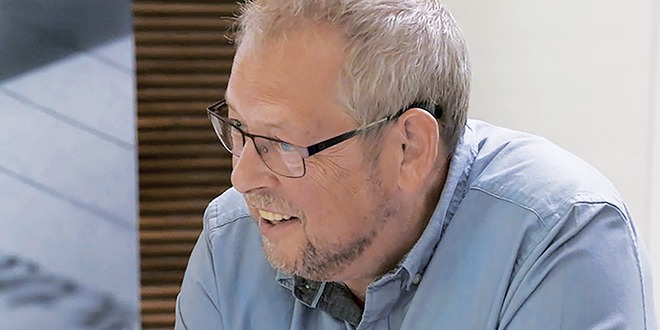People with type 2 diabetes write back to their younger selves, to share personal insights and reflect on their experience of living with diabetes and starting on insulin therapy. In this post, Andrew reflects on living with diabetes.
Andrew, 63, is a transport supervisor and has a knack for taking most things in his stride. It could simply be his temperament, or it could be that after becoming a firefighter at age 18, he grew accustomed to facing difficulties without overreacting. “You tend to look at a problem straight on and say, ‘OK, I’ll deal with it’,” he explains.
So, he wasn’t terribly upset when he was diagnosed with type 2 diabetes at 36 – though he was surprised. While in the hospital for an operation, a routine blood test indicated that he had diabetes. He hadn’t noticed any symptoms, pinning his blurry vision and excessive thirst on his job as a truck driver.
At age 46, Andrew was told he needed to add insulin to his diabetes treatment regimen, in conjunction with diet and exercise. Though, it wasn’t just the insulin that bothered him. It was the knock-on effect that meant he would have to give up his bus and truck driving licences. Even though he was an operations manager for a well-known logistics company, he relied on driving as an enjoyable source of income when work was limited, so he felt a keen sense of loss. Andrew is writing to himself at this time, when he learnt he would have to take insulin and therefore forfeit his licences.
Dear Andy
You are really knocked back by this news. Losing your vocational driving licences for trucks and buses is like losing a part of yourself. They weren’t easy to get in the first place and now you’ve had them for 25 years. That’s 25 years of driving the correct number of days each year to keep them current and earn a bit of extra money. The licences were good to have as a fall back if ever you lost your job.
And, those licences saved you and your family once – remember? You were laid off. You had no work and no income. This meant you couldn’t keep up with the house payments and in the end, you were bankrupted. Thanks to your licenses though, a friend found some work for you in Northampton, about 120 kilometres from home. And after six months of driving five nights a week there and being home for two days, you found a house to rent in Northampton and the family joined you there.
On top of that, you are also a little nervous about how having to take insulin and regularly checking your blood sugar will affect your daily routine. You don’t have regular meal times at your job. And what will people think? It feels almost as if you’d got something that they hadn’t, and it makes you different, but not in a good way.
Luckily, Andrew, friends and family will not treat you any differently. In fact, they will accept quite readily that it’s just a part of who you are. Starting insulin is not as scary as you might think, not at least because you will have a good nurse at the hospital who will be very clear about what to do. Before you realise it, insulin will become a normal part of your routine. Your blood sugar may go up and down, but you are able to manage it with your new treatment regimen. You could consider a bit more exercise, but I know that with a busy working life, spare time is scarce.
You will also go back to music as a hobby, even though you thought playing again might not be possible. This will keep you connected to people in a special way and bring you joy.
There will be trials ahead – as there are in anyone’s life. While I don’t wish them on you, I will say that some difficulties will make you look at life differently, as well as helping to make changes that will improve your diabetes control.
Still carrying on,
Andrew
This story has been edited by Ellyn Spragins and shared with support from Novo Nordisk Canada. The views and opinions expressed are not representative of Novo Nordisk, and should not be considered treatment advice. Novo Nordisk has permission to share this letter and included personal details.
 Diabetes Care Community Learn, connect and care
Diabetes Care Community Learn, connect and care




